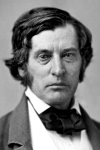Charles Sumner declined to take any further part in Preston Brooks’ prosecution than grand jury testimony; he did not consider himself at all well. The psychological strain of revisiting the attack constantly, perhaps even in Brooks’ presence, can’t have appealed even when he felt physically better and Sumner rarely felt that. Visitors described him as a man much enfeebled, who may not make it. Francis Blair’s home in Silver Springs gave him some relief from Washington’s summer heat, but it remained close enough for a steady steam of visitors that further exhausted the Senator.
On July 5, Sumner returned to Washington City to put his affairs in order before departing for less demanding climes. That prompted a fresh bout of visitors, including both antislavery luminaries and members of the diplomatic corps. Edward L. Pierce’s Memoir and Letters of Charles Sumner relates that the only administration men, excepting Lewis Cass who Sumner once befriended in Europe, stayed away. The parade of well-wishers can’t have helped, but Sumner left the city on July 7, staying the night in Baltimore before proceeding on to Philadelphia and Dr. Caspar Wister. At the time, Sumner expected to return to the Senate in August.
Dr. Wister examined Sumner on July 9 and found him in
A condition of extreme nervous exhaustion, his circulation feeble, and in fact every vital power alarmingly sunken. At that time his steps were feeble and tottering, as if in extreme old age; he complained of constant pain in the back and lower extremities, -in the latter it was a tired and weary sensation and he had a sense of construction and pressure about the head. At that time his pulse was quick and small, appetite language, and his sleep broken, disturbed, and unrefreshing. All the above conditions were heightened by exertion either mental or physical.
Wister recommended Sumner go to Cape May for relaxation. He spent a week there, improving, but then suffered another relapse. On July 22, he wrote to Giddings that he might resign his seat. Sumner still wanted to come back and resume his duties, but clearly doubted that he could. He abandoned Cape May for a health resort at Cresson, Pennsylvania. There, but he managed a daily ride on horseback, though he still struggled with walking. By mid-August, he could write -again to Giddings- that he hoped “to do good service in the coming campaign” for the presidency. The Republicans nominated John C. Fremont in June, with a sympathy vote going to Sumner for vice-president.
On August 28, Sumner wrote a friend that he had not made a full recovery,
but I ride on horseback, converse, read, write letters, and hope soon to be in working condition, though I fear that a perfect prudence would keep me from all public effort for some months to come.
Walking still exhausted him, but Sumner felt on the mend. He expected to return to Massachusetts soon, but dreaded the inevitable public welcome. He would rather “slip into Massachusetts, run about for a few days” and then maybe get on the stump.

You must be logged in to post a comment.